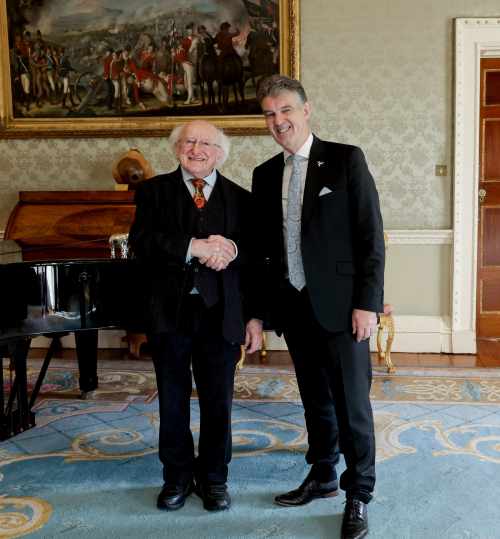Speech and poem by Sabina Higgins
The Moat Theatre, Naas, Co. Kildare, 1st February 2024
This is an excerpt from a piece entitled Witnessing by Alexandra Magearu, written to accompany the poem Diaspora by Hala Alyan who is an Arab American writer of anti-war poetry.
Witnessing
DIASPORA
“This is weight
This is I did not know they made smoke like ocean
This is aluminum dusk and sulfur clouds
This is sabah-al-kher
Morning of luck
Morning of cinder
This is steam and ruin and flashlit bodies
This is counting your loss
This is losing count.”
These are the first few lines of Hala Alyan’s poem “Diaspora” written in response to the 2014 Israeli bombing of Gaza. During the war, over two thousand Gazans were killed and over ten thousand were injured, the infrastructure destroyed, many more left homeless. A war of collective punishment, seeking not only to intimidate, to tear down, to kill and to maim, but to destroy kinships, to annihilate foundations and to interrupt connections. The Israeli settler colonial expansion in East Jerusalem and the West Bank occupies more land day by day through the fragmentation of Palestinian society, the incessant construction of Israeli settlements, the expulsion of Palestinians from their homes, and the rupturing of the landscape through an apartheid network of highways and checkpoints connecting Israeli settlements and rending asunder Palestinian towns and villages. The wars in Gaza have aimed, similarly, at creating breaks that reverberate throughout Gazan society—the erosion of a sense of community, the destruction of any structures that sustain life, and ultimately stifling the very possibility of life. As we watch the most recent genocidal Israeli war on Gaza unfold on our screens, and as we witness many more thousands of Palestinians displaced, killed or buried under the rubble of demolished apartment buildings, the expansionist logic of settler colonialism appears to be intensifying at a frightfully swift pace.
This is weight, writes Alyan. Depending on how you choose to hear it, this is a burden and it is a moment of waiting. It is the weight of witnessing and the interminable wait before the human losses are counted, it is the weight of losing count. The sheer force of the techno-military industrial complex sustained by the U.S.-Israeli alliance manifests through the transformation of natural things into fire—the aluminum dusk, clouds of sulfur, morning of cinder, flashlit bodies. Settler colonial power functions through the complete monopolization of everyday life and the occupation of those very coordinates that constitute existence: the integrity of the body and the senses, relationships of kinship, connections to a community, distributions of space, and senses of time. In this sense, settler colonialism is biopolitical. It aims not only to destroy, but also to control, to take away voice, image and representation, to swallow up land, to distort time, and to distract from the passing of time. The time of the occupation is endless.
Time is relative. The timing of the bombing, the felt experience of time. The fact that bombs can be released through the pressing of a button, from a sheltered and highly securitized position of privilege. In a time of drone warfare, temporal scales take new dimensions. How are we to compare the time it takes to release a bomb, a fraction of a second from the point of view of the one seated in front of a computer screen, to the time of the devastation of the bomb, in which human lives are irremediably and forever damaged? Technology has brought us closer and further apart.
One of the many attributes of St. Brigid is that she was a Peace Maker. In the icon in the Church in Kildare, she is depicted with her foot on a sword as an anti violence statement. She was a diplomat and intervened in disputes between chieftens and different powers of her time. I would imagine if she were here now to see her beautiful earth drowning and burning and her people starving, she would agree there is no justification for war and that the trillions spent on armaments should and could be spent on ensuring there is no poverty and no hunger.
Celebrating St Brigids Day, celebrates the beginning of Spring, and new life and new growth . Also in the icon in the Church in Kildare, we see Brigid celebrating the beginning of Spring with the lambs and the spring flowers. To this end we are reminded of the school day poems celebrating spring.


